Can we survive in a world without work? Could we live happily on a universal basic income? And how can we transform into a zero-carbon economy? Tim Bliss searches for answers in five must-read books about the end of capitalism and what comes next.
The political left is facing an unprecedented global crisis.
Across Europe social democratic parties are in almost uniform decline. The fall of Germany’s SPD, the French Socialist Party and the Dutch Labour Party all show the centre-left being wiped off the electoral map.
The left, suffering an identity crisis, has been quick to criticise the status-quo but reluctant to embrace radical new ideas for meaningful change. Now, however, this could be about to change as the battle of ideas returns to progressive politics, with increasing demands for unified and hopeful visions for the future.
Post-capitalism is becoming a central pillar of these discussions, breaking away from old divides of “reform versus revolution” and encouraging a move towards a profoundly different economic system – one which re-embraces the lost utopian traditions of the left.
Here we feature five books that set out radically different futures, arguing for changes that are both possible and necessary. They challenge existing norms and provide genuine alternatives, reflected in radical policies which may yet see the left reclaim the future.
Inventing the Future: Postcapitalism and a World without Work (Nick Srnicek and Alex Williams, 2015)
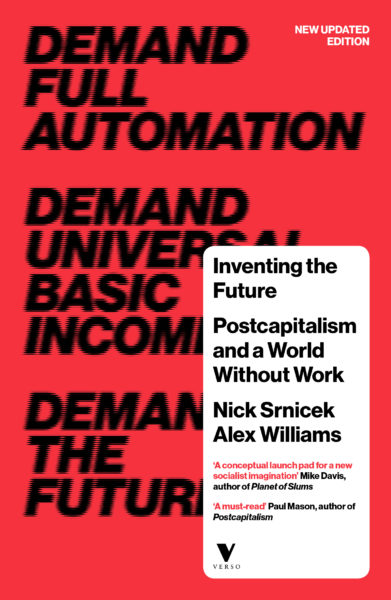 Inventing the Future boldly calls for the outright encouragement of a world without work. It’s a revolutionary and exciting concept from these American co-authors in a society both obsessed with and dependent on formal employment.
Inventing the Future boldly calls for the outright encouragement of a world without work. It’s a revolutionary and exciting concept from these American co-authors in a society both obsessed with and dependent on formal employment.
It is one of the more comprehensive and academic books on this list. However a more demanding style of writing does not detract from the importance of the content – which sets out a radically different economic model and the means to achieve it.
The book begins with a scathing critique of the contemporary left.
This serves as an uncomfortable reality-check, but a necessary one that does not shy away from hard-truths. The failures of the left are contrasted with the successes of the right in a historical exploration of the dominance of neoliberalism, providing vital lessons on constructing new political narratives.
The vision itself – centred on encouraging automation and providing a basic income to all citizens – is powerful and compelling, although slightly less developed than in other texts like Utopia for Realists – which devotes several chapters to this. However, the real value of the book comes from the comprehensive and innovative proposals to implement the programme and initiate change– something other political thinkers struggle to convincingly envision.
Thanks to its academic approach (Srnicek is an academic and Williams a political theorist), Inventing the Future may lack universal accessibility, but it is a ground-breaking work that performs the rare (and invaluable) feat of specifically explaining how to implement radical ideas rather than simply fixating on the ideas themselves. It is a vital and powerful book that values the practical process of change as much as the ideology that drives it.
This Changes Everything: Capitalism vs the Climate (Naomi Klein, 2014)
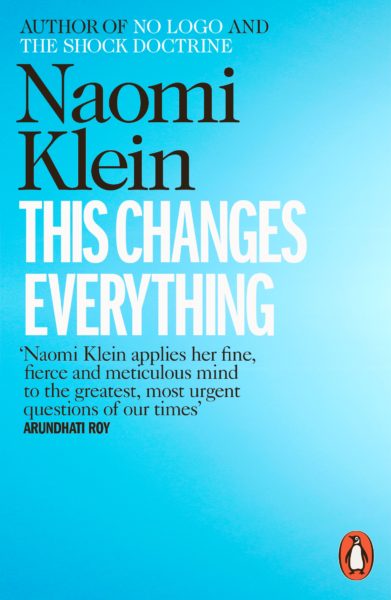 No credible vision of a postcapitalist system can ignore the critical issue of the environment, and while the majority of texts do consider sustainability issues, Naomi Klein’s vision stands out for putting them front and centre of any new economic system.
No credible vision of a postcapitalist system can ignore the critical issue of the environment, and while the majority of texts do consider sustainability issues, Naomi Klein’s vision stands out for putting them front and centre of any new economic system.
This Changes Everything centres on the incompatibility of capitalism – which values growth above all else – with a sustainable environment. Accepting this is vital to achieving an environmentally-viable future economic system, and Klein uses it to justify her radical proposals.
This book is frightening, eye-opening and maddening.
But it’s also inspiring – containing a bold, globally redistributive, zero-carbon programme to deal with the greatest challenge of our times, and create a fairer society in the process. Klein sees opportunity in the challenges of climate change, which may be the shock needed to initiate change.
The sentiments and proposals in the book are welcome, although unfortunately the proposed path to change is too reliant on localism; which achieves small, limited victories rather than systemic change. Local resistance is an important aspect of environmentalism, but as Klein clearly grasps the scale of the threat from climate change she should recognise that it will only be solved through organised, large-scale and international strategies – which she focuses on far less.
Nonetheless, with the future of humanity depending on action against climate change, Klein offers us not just an alternative way forward, but perhaps the only way forward.
Utopia for Realists: And How We Get There (Rutger Bregman, 2017)
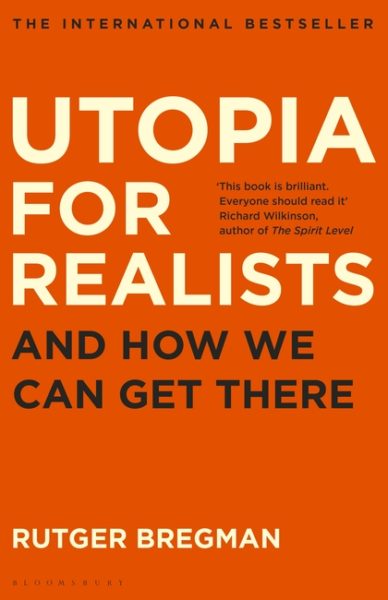 Dutch historian Rutger Bregman’s Utopia for Realists is the most accessible book among our picks. With a simple but engaging style, it’s detailed (but not academic) and the arguments are constructed to be persuasive beyond the political left.
Dutch historian Rutger Bregman’s Utopia for Realists is the most accessible book among our picks. With a simple but engaging style, it’s detailed (but not academic) and the arguments are constructed to be persuasive beyond the political left.
The central theme is that progressive politics has lost the ability to inspire and create a better future. Bregman claims that the contemporary left is sure about what it opposes, but confused and divided over what it supports. Bregman takes on this problem, proposing his own “utopian” programme.
The vision is the implementation of a universal basic income, as well as a 15-hour working week, restructuring economic priorities towards producers of wealth, and, finally, a borderless world. This programme addresses a range of social justice issues such as poverty, precarious employment and economic injustices in developing nations, all while convincingly arguing the case for each policy.
There are several notable faults with the book: Bregman ignores environmental issues, focuses too heavily on the western implications of his proposals and spends too much time justifying his policies to the political right rather than arguing the more convincing progressive cases.
Despite these issues, the author dares to dream big, and he hits the mark.
Bregman challenges preconceptions, refutes criticisms, writes brilliantly, and he inspires. In a climate dominated by depressing polls, disappointing election results and a divided left, this book offers a transformative political programme that will give you hope for the future. But Bregman does not leave you complacent – making clear throughout that this future must be fought for.
PostCapitalism: A Guide to Our Future (Paul Mason, 2016)
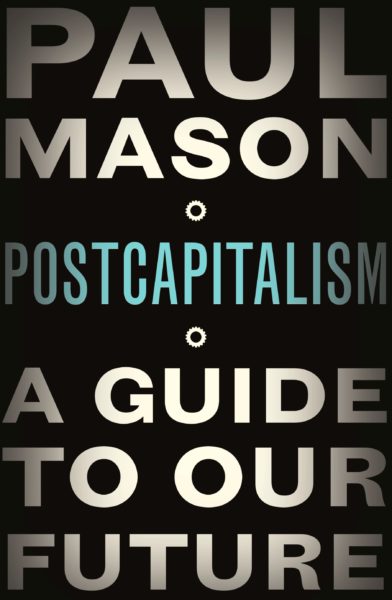 Paul Mason’s PostCapitalism is easily the most economically-focused title in this collection, taking great care to explain clearly the economic justifications for progression away from neoliberal capitalism – a system that, according to Mason, is inescapably based on waves of boom and bust.
Paul Mason’s PostCapitalism is easily the most economically-focused title in this collection, taking great care to explain clearly the economic justifications for progression away from neoliberal capitalism – a system that, according to Mason, is inescapably based on waves of boom and bust.
Mason’s economic critique of capitalism forms a significant portion of the book, and while this context is certainly necessary and impressively detailed, he might have reserved a similar level of detail for his own proposals.
Nonetheless Mason provides a captivating economic education that highlights the failings of our current system and the necessity for change – particularly through stark warnings about the potential scale of future automation and the threat of climate change.
There is hope alongside these bleak warnings though, with the closing chapter finally providing the titular postcapitalist vision.
Mason excitedly proclaims the potential of automation to eradicate “bullshit jobs”
(alongside a basic income safety net), the potential for new technology to provide the data needed to plan a zero-carbon economy and rejection of an economy dominated by finance and free market rhetoric.
In PostCapitalism Mason is a historian, an economist and a political philosopher all at once. He may ramble at times but his logic is convincing and his arguments are sobering. The long wait for a new political programme pays off in a book that begins as a chilling warning against complacency and ends as a call to political action.
The Precariat: The New Dangerous Class (Guy Standing, 2011)
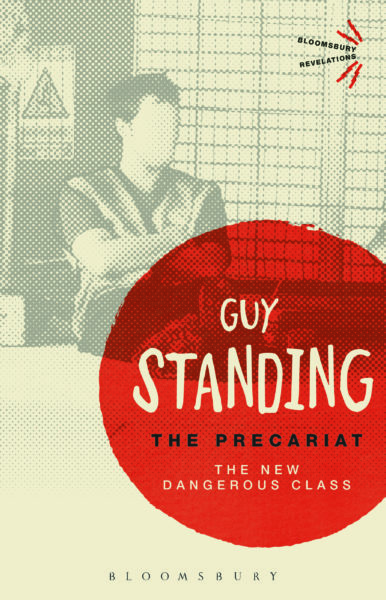 Any proposal for a better economic system must assess current challenges to identify improvements and justify the need for change. This is the key strength of Guy Standing’s ground-breaking reassessment of the contemporary economy, one defined by growing trends towards precarious employment.
Any proposal for a better economic system must assess current challenges to identify improvements and justify the need for change. This is the key strength of Guy Standing’s ground-breaking reassessment of the contemporary economy, one defined by growing trends towards precarious employment.
Standing expertly charts the decline of 20th-century capitalism, long sustained by expectations of job stability, career progression and comfortable living – expectations that are quickly giving way to acceptance of economic instability.
The book concludes with a hopeful description of a “politics of paradise”, which unlike other books on this list, has a refreshing focus on immediate short-term problems.
This politics strongly rejects the rapid spread of instability and aims to reclaim working rights and leisure time through a “mildly utopian” combination of moderate and radical changes; from enhanced employment rights to a universal basic income.
A glaring problem with the vision is that it is based on the idea that the precariat should be the agent of change in society – a position at odds with their status as a group of loosely-connected individuals that are time and cash poor; all traits that tend to drain political tendencies. However this complaint does not detract from the programme itself.
The “politics of paradise” is neither the most visionary nor the most detailed programme for change on this list. However what Standing lacks in grand statements and ideas he makes up for in immediate answers to real, growing problems.
Delve further into the issues with this interrogation of the book.

MORE:
Thinking about launching a political campaign? The students whose petition went to Parliament share their top tips.
Three essential books to help launch your own protest movement.
Lacuna’s top 10 books on the history of unemployment.
Main image by Clay Banks on Unsplash.



